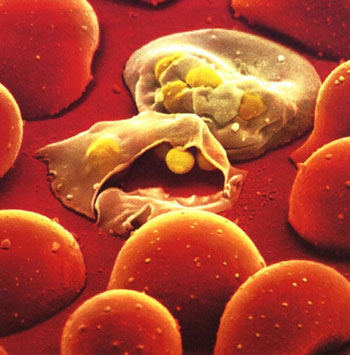SWEDISH SOUTH ASIAN STUDIES NETWORK
Department of Medicine at the Karolinska University Hospital in Solna, Karolinska Institutet Medical University, Stockholm:
Other departments/units at Karolinska Institutet Medical University |
Address: Karolinska Institutet, Institutionen
för medicin, Karolinska Universitetssjukhuset Solna M1:01, SE-171
76 Stockholm
Fax: +46 (0)8 33 73 94
Web page: http://www.ki.se/medicin/medicine_ks/index_en.html
The Department was created in its present form in 1993,
and has since then become one of the largest departments at Karolinska
Institutet. The core activities of the Department of Medicine are clinical
and undergraduate education for medical as well as biomedical students,
post-graduate education,
and research in different areas of biomedicine.
The Department of Medicine consists of 34 research groups belonging to
13 different research units representing
a broad variety of medical entities. The research groups are scattered
on the Karolinska Hospital area in Solna, in association with their respective
clinics, as well as localized within the Center
for Molecular Medicine (CMM).
South Asia related research at the Dept. of Medicine:
|
Malaria Research Unit:
Visiting address: Malariaforskningsenheten,
Entrance M9:02, Karolinska University Hospital in Solna
Fax: +46 (0)8 517 718 06
Contact person: Professor Anders Björkman, phone: +46 (0)8 517 718 66
Professor Björkman has 20 years experience from different fields of malaria research both in Africa and Asia resulting in over 100 scientific publications. In the 1970s he was also working as an epidemiologist and coordinated the WHO Smallpox Eradication Programme in India and Bangladesh for a period of nine months.
 The Malaria Research Unit at KI is involved in a research
collaboration with the Dept. of Pathology and Microbiology at Aga Khan
University (AKU) in Karachi, Pakistan. Plans for the collaboration on
malaria research in Pakistan was drawn up during a visit to Stockholm
by Assistant Professor Mohammad
Asim Beg, a clinical parasitologist, from AKU in September 2005.
The Malaria Research Unit at KI is involved in a research
collaboration with the Dept. of Pathology and Microbiology at Aga Khan
University (AKU) in Karachi, Pakistan. Plans for the collaboration on
malaria research in Pakistan was drawn up during a visit to Stockholm
by Assistant Professor Mohammad
Asim Beg, a clinical parasitologist, from AKU in September 2005.
The project coordinator at KI is Dr. Andreas
Mårtensson, a specialist in infectious diseases
with working experience from Bethania Hospital in Sialkot, Pakistan in
the early 1990s. Dr. Mårtensson is Swedish coordinator for the bilateral malaria rsearch project. He is working as a post-doc both at the Department of Medicine, and at the Division of Global health
(IHCAR), Karolinska Institutet.
In November 2005 Sida/SAREC gave SEK 1.2 m as a two-years doctorate
project titled ”Clinical trials of new
combination therapies for P. Falciparum malaria – Role of PCR genotyping”.
The research project also involves Dr. José
Pedro Gil, senior research fellow
at the Malaria Research laboratory, heading the molecular biology research.
He was responsible for the scientific activities related to the EU 5th
Framework project – ”Development of a malaria
resistance DNA chip as a public health tool for the management of Plasmodicum
falsiparum malaria drug resistance.” The project was completed in December 2005.
PhD candidate Johan Ursing has also been involved in the project.
In February
2006 the project entitled
”Rational
use of antimalarial drugs in Pakistan” – was given SEK
60 000 as a research planning
grant from SASNET.
The SASNET planning grant was used to initiate the collaboration work, and to prepare for an application for a Asia Link project from the Swedish Research Council.
The initial PCR-genotyping study started in the Fall 2006, and was further developed during 2007 when Andreas Mårtensson and Dr. Johan Ursing again visited
AKU.
In August 2008, Prof. Anders Björkman received another SASNET planning grant for a project titled ”Molecular characterization of clinical isolates of Plasmodium falciparium in Pakistan”. More information about the 2008 SASNET planning grants.
The project will commence in September 2008 and run over a period of 12 months.
Planning and implementation will be done in close collaboration with Department of Pathology & Microbiology, AKU, Karachi, and the Malaria Research Unit, KI. Initially, a female PhD student from AKU (Ms Najia Ghanchi) will receive training in the malaria specific PCR techniques (see below) at the Malaria Research Unit, KI, during a period of 4 months. Thereafter, she will set up and optimize these methods at AKU with technical assistance from KI, which will include development of Standard Operating Procedures (SOPs) as well as systems for quality assurance to meet all requirements of Good Laboratory Practice (GLP). Then the same biological collection of 300 blood samples will be subjected to PCR analyses to establish baseline frequencies of drug resistance associated SNPs in Pakistan. The results will be submitted for publication in scientific journals. After the establishment of the PCR techniques at AKU this will serve as a core facility for malaria research and development in Pakistan.
Project abstract: Plasmodium falciparum malaria is a serious public health problem in Pakistan that has received scarce scientific attention. No solid data on drug resistance are available. There is also lack of insight into if and how multidrug resistant parasite populations have spread/affected this part of Asia. In a joint project with Aga Khan University 300 clinical P. falciparum isolates have already been collected. We plan to characterize these with regards to molecular markers of drug resistance, some established in our unit. Our project will provide baseline data on resistance related markers to commonly used monotherapies and partner drugs in the globally recommended artemisinin-based combination therapies. This will provide a basis for future joint research development, insight into drug resistance gene flow in this region and enable Pakistan to form an evidence-based antimalarial drug policy.
 In September 2009, Dr. Andreas Mårtensson received another SASNET planning grant, this time for a project entitled ”Molecular characterization of Plasmodium falciparum malaria in Madhya Pradesh, India –
implications for rational use of anti-malarial drugs”. More information about the 2009 SASNET planning grants.
In September 2009, Dr. Andreas Mårtensson received another SASNET planning grant, this time for a project entitled ”Molecular characterization of Plasmodium falciparum malaria in Madhya Pradesh, India –
implications for rational use of anti-malarial drugs”. More information about the 2009 SASNET planning grants.
The project has been carried out in collaboration with Ruxmanibeen
Deepchand Gardi Medical College in Ujjain, India. On the Swedish side the project involves Mårtensson, Björkman, and Gil. On the Indian side, the following researchers are involved: PhD candidate Ashish Pathak, Dr. S.B. Gawarikar, Dr. Ashish Sharma,
Dr. Jagdish Mandliya, and Dr. Vishal Diwan.
Dr. Vishal Diwan currently holds a position as post-doc at the Division of Global Health (IHCAR), Karolinska Institutet, and and PhD candidate Ashish Pathak is also registered at IHCAR.
Project abstract: Plasmodium falciparum malaria remains a serious public health problem in India that has
received scarce scientific attention. Particularly, in Madhya Pradesh, no solid data on
antimalarial drug resistance of P. falciparum are available, which presently precludes rational
use of antimalarial drugs in the state. There is also an insufficient understanding with regards to
if and how multidrug resistant P. falciparum parasite populations have spread and affected this
region. We propose a joint undertaking between Karolinska Institutet and Ruxmanibeen
Deepchand Gardi Medical College, Ujjain, India, to characterize the P. falciparum population in
rural Madhya Pradesh molecularly. Our collaborative project will provide baseline data on
distribution of established molecular markers of antimalarial drug resistance to commonly used
monotherapies and partner drugs in the globally recommended artemisinin-based combination
therapies. The proposed study will provide basis for future joint researchdevelopment, insight
into drug resistance gene flow in this region and enable policymakers in Madhya Pradesh to form
an evidence-based antimalarial drug policy against P. falciparum malaria.
Molecular Immunology Unit:
Contact person: Associate Professor Mats
A A Persson, Molecular Immunological Laboratory,
Unit of Internal Medicine, Department of Medicine.
In November 2004 Mats A A Persson received a three-years grant from the
Swedish Research Links programme for a project called ”Hepatitis
C Virus Persistence: Virus and Host Related Factors”. The project
is related to Pakistan. More information on
the Swedish Research Links grants 2004.
He supervised the first sandwich PhD from Aga Khan University’s
(AKU) own PhD program, Anita Yasmeen.
She graduated at AKU in 2005, after travelling between AKU and KI during
her studies. The thesis was entitled ”An
immunological study of the possibility of early determining the risk
of Chrinicity in Hepatitis C Infection, a major problem in the Subcontinent.”
SASNET - Swedish South Asian Studies Network/Lund
University
Address: Scheelevägen 15 D, SE-223 70 Lund, Sweden
Phone: +46 46 222 73 40
Webmaster: Lars Eklund
Last updated
2011-06-16
